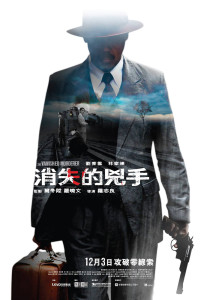The Vanished Murderer
消失的凶手
Hong Kong/China, 2015, colour, 2.35:1, 3-D (China only), 120 mins.
Director: Luo Zhiliang 罗志良.
Rating: 7/10.
Follow-up to whodunit The Bullet Vanishes is classily played and designed but not so classily written.
Tiancheng county, northern China, Aug 1932. During a visit by a foreign VIP to the town’s island prison, murderess Fu Yuan (Jiang Yiyan) is found to have escaped from her locked cell, which she hadn’t left for six months. Police detective and criminologist Song Donglu (Liu Qingyun) investigates and finds that she laboriously dug a tunnel with a soup spoon, though it was apparently never finished. He then receives a letter from Fu Yuan, who says she’s waiting to meet him in Xiangcheng [Hong City] on 20 Aug. On the train, Song Donglu is accosted by a woman (Li Xiaolu) he hasn’t seen for eight years and who pulls a gun on him; however, no one is hurt. On the appointed date, Song Donglu meets Fu Yuan by the grave of her grandmother, Chen Fang Shaolan, for whose death – due to a slum clearance scheme by the town’s all-powerful businessman-banker Gao Minxiong (Guo Xiaodong) – she is seeking vengeance. Fu Yuan takes Song Donglu to a lecture by Huo Hua (Lin Jiadong), a philosphy professor she admires. Later, as they walk the streets, the body of a  man, Li Zhongzhi, falls off a building. Fu Yuan disappears but the woman in the train – who is Chang Sheng, an arranged bride whom Song Donglu had left at the altar – reappears. Arrested, Song Donglu proves his identity to local policeman Chen Maojin (Feng Xiaoyue) and sets out to solve the mystery with his help; he also agrees to take along Chang Sheng, who won’t stop stalking him, as his assistant. On the dead man’s shirt was scrawled a protest against Gao Minxiong’s exploitation of workers, of whom the victim was one. Gao Minxiong makes it clear to both Song Donglu and Chen Maojin that he wants the case to be treated as a murder, not a suicide. Song Donglu is contacted by Huo Hua, who says Fu Yuan had predicted the death of Li Zhongzhi on 20 Aug and, through a series of riddles, had let him know that it would be a murder disguised as a suicide. Later, another apparent suicide is found in the street. As workers’ protests mount in the city, and Gao’s private militia led by the ruthless Tan Hu (Sun Jiajun) tries to crush them, Song Donglu continues his investigation, which seems to point to Fu Yuan as the mastermind.
man, Li Zhongzhi, falls off a building. Fu Yuan disappears but the woman in the train – who is Chang Sheng, an arranged bride whom Song Donglu had left at the altar – reappears. Arrested, Song Donglu proves his identity to local policeman Chen Maojin (Feng Xiaoyue) and sets out to solve the mystery with his help; he also agrees to take along Chang Sheng, who won’t stop stalking him, as his assistant. On the dead man’s shirt was scrawled a protest against Gao Minxiong’s exploitation of workers, of whom the victim was one. Gao Minxiong makes it clear to both Song Donglu and Chen Maojin that he wants the case to be treated as a murder, not a suicide. Song Donglu is contacted by Huo Hua, who says Fu Yuan had predicted the death of Li Zhongzhi on 20 Aug and, through a series of riddles, had let him know that it would be a murder disguised as a suicide. Later, another apparent suicide is found in the street. As workers’ protests mount in the city, and Gao’s private militia led by the ruthless Tan Hu (Sun Jiajun) tries to crush them, Song Donglu continues his investigation, which seems to point to Fu Yuan as the mastermind.
REVIEW
Three years after their classy, China-set whodunit The Bullet Vanishes 消失的子弹 (2012), Hong Kong director Luo Zhiliang 罗志良 and designer-turned-scriptwriter Yang Qianling 杨倩玲 revisit their Republican-era detective in another story of murky business dealings, protesting workers and noir-ish crime – though to less satisfying effect. After a first hour that’s well up to scratch, with plenty of suspects, bodies and mysterious goings-on, the film loses traction in its over-long second hour, becoming discursive when it should be pressing on towards the conclusion. It then throws up its hands and stages an action finale on a runaway train that’s designed just to show off the 3-D to Mainland audiences. The overall calibre of the performances, plus the film’s stylish look, earn The Vanished Murderer 消失的凶手 an extra point, but they can’t really hide the fact that the script is a couple of notches below Bullet‘s.
Yang certainly kicks off her screenplay in grand style with a locked-room mystery set in a prison: how did husband-killer Fu Yuan – the detective’s ethereal muse in Bullet – escape from a cell she hadn’t left in six months, via a secret tunnel she apparently didn’t finish digging? After that, the developments keep coming as tousled detective-cum-criminologist Song Donglu first gets a letter from Fu Yuan, arranging to meet him in another city on a certain date, and then is held up by a gun-wielding young woman en route. The former tells him she’s planning revenge for the death of her granny, while the latter turns out to be a ditched bride from Song Donglu’s past. Meanwhile, in Xiangcheng [Hong City] people are jumping off rooves in protest at the labour practices of local tycoon Gao Minxiong – who runs his own black-shirt militia led by a butch lesbian – and workers and students are revolting.
This is entertaining stuff, richly shot in greys and golds by Hong Kong’s Feng Yuanwen 冯远文 [Edmond Fung] (Accident 意外, 2009; 12 Golden Ducks 12金鸭, 2015) and designed by veteran p.d. Wen Nianzhong 文念中 [Man Lim-chung] in a succession of Republican-era locations (around Shanghai) and some impressively constructed sets, of which the city’s train station, all stone staircases and period details, is a wonder in itself. It all looks filmy rather than real 1930s, but makes a suitably handsome frame for the whodunit shenanigans. The problem is that, around the halfway mark, when most of the mystery appears to have been solved, Yang’s script starts diving down alleyways when it should be pressing on home, with red herrings and scenes that don’t advance the drama plus a finale that spins on the old Hong Kong staple of monetary greed.
Among the diversions is the theme of social unrest, which was also an element of Bullet but was better woven into the plot. Here, it becomes an excuse for several setpieces that divert the film away from the main plot, including a street demonstration – rousingly scored – in which the workers almost break into a chorus from Les Misérables. It’s not that such scenes are poorly staged; in fact, their effectiveness makes them even more distracting.
The differences between the first and second halves of the film are striking. With virtually no conventional action, the opening hour proceeds very much like Bullet – brooding, atmospheric, and with an ambitious mix of themes from personal revenge through philosophical concepts to social politics. In the following hour most of this is thrown to the winds: the plot makes less and less sense, and deduction gives way to action setpieces – an entertaining chase on horseback and an all-stops-out finale on a speeding train. Bullet was more about the main character’s deductive journey than about splashy action and visual effects; Murderer still wants to be, but loses its nerve halfway. Another period crime mystery, the Shanghai-set The Unbearable Lightness of Inspector Fan 暴走神探 (Clara Law 罗卓瑶, 2015), had many of the same structural problems.
Looking slightly more relaxed this time in a Fedora rather than a Homburg, but still bringing the same tousled perplexity to the role, Hong Kong’s Liu Qingyun 刘青云 [Lau Ching-wan] holds the increasingly sprawling film together with his quietly dignified detective, even when he’s flailing for clues. Replacing Bullet actor Xie Tingfeng 谢霆锋 [Nicholas Feng] as his sidekick, Li Xiaolu 李小璐 cuts a lively figure, alternately tomboyish and coquette-ish, though it’s fellow Mainlander Jiang Yiyan 江一燕 (reprising her role of a husband-killer from Bullet) who’s more the noir-ish heart of the film, taking it to another level whenever she elegantly wafts on screen.
The same could be said for China’s Guo Xiaodong 郭晓冬 (so good as the villain in Motorway 车手, 2012), who exudes contained power as the city’s ruthless super-capitalist. In this kind of company, Anglo-Chinese actor Feng Xiaoyue 凤小岳 [Rhydian Vaughan], as so often, makes a mild impression, showing no special chemistry with Liu and little sense of authority in his role as a local cop. Equally miscast is Hong Kong veteran Lin Jiadong 林家栋 [Gordon Lam] as a philosophy prof, proving that a role of this complexity needs more than just a pair of bookish spectacles.
Typifying the film’s creative confusion, the part-whistled chamber score by Hong Kong’s Chen Guangrong 陈光荣 [Comfort Chan] makes a nicely breezy accompaniment to the horse-chase sequence but is completely inappropriate when later re-used for the train finale. The use of a modern-sounding, English-language song at a key emotional moment near the end is also disorienting. The two films’ Chinese titles, which mean “The Disappearing Bullet” and “The Disappearing Murderer”, have a symmetry that’s lost in the English ones. The “vanished murderer” of the second film is, presumably, the character of Fu Yuan.
CREDITS
Presented by Le Vision Pictures (CN), Le Vision Pictures (Hong Kong) (HK). Produced by Film Unlimited (HK).
Script: Yang Qianling. Photography: Feng Yuanwen [Edmond Fung]. Editing: A Lao, Li Jiarong. Music: Chen Guangrong [Comfort Chan]. Production design: Wen Nianzhong [Man Lim-chung]. Art direction: Li Jianwei. Sound: Du Duzhi, Wu Shuyao, Liang Zhida. Action: Tanigaki Kenji. Visual effects: Lin Hongfeng, Li Wenjun, Xu Debiao (Free D Workshop).
Cast: Liu Qingyun [Lau Ching-wan] (Song Donglu), Lin Jiadong [Gordon Lam] (Huo Hua, professor), Li Xiaolu (Chang Sheng), Jiang Yiyan (Fu Yuan), Guo Xiaodong (Gao Minxiong), Feng Xiaoyue [Rhydian Vaughan] (Chen Maojin), Sun Jiajun (Tan Hu, private militia head), Miao Junjie (Gao Liang, Gao Minxiong’s son), Yu Xiaotong (Yang Lingchen, student of Huo Hua), Zhou Shaodong (prison warden), Zheng Ya (VIP’s wife), Shen Juhui (Seven), Liu Xiaoyu (female prisoner), Song Jiateng (Chang Sheng’s bodyguard), Hai Lu (Pian Pian), Jonathan Kos-Read (foreign official at party), Xiao Fan (Xiaofan, protesting student), Liu Xun (Li, first suicidee’s father), Xu Xu (Xiaoxiang, first suicidee’s daughter), Zhang Guifeng (slum mother), Zhang Jie (slum daughter), Xiao Mile (girl on rooftop).
Release: China, 27 Nov 2015; Hong Kong, 3 Dec 2015.
